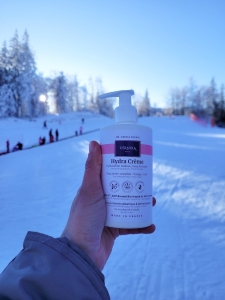Reading Time: mins
At the heart of our health concerns, vitamin D occupies a special place, especially for those of us with sensitive skin. This micronutrient, often dubbed the "sunshine vitamin", plays a crucial role in supporting our bone health, but its influence goes far beyond that, affecting our skin health too. Understanding its importance, and how to compensate for a potential deficiency, is essential for supporting healthy, resilient skin.
Vitamin D significantly influences the skin barrier and the skin's immune system. Research shows that adequate levels of vitamin D can reduce inflammation, improve wound healing and reduce susceptibility to skin infections. This highlights the direct link between vitamin D and maintaining healthy skin, especially for those who are more likely to have sensitive skin or skin conditions such as eczema or psoriasis.
Another often overlooked aspect is vitamin D's role in preventing skin ageing. Studies suggest that vitamin D may help protect the skin against the damaging effects of UV rays, including premature aging. For those seeking to maintain youthful, resilient skin, ensuring adequate vitamin D intake becomes not only a question of overall health, but also of skin health.
Vitamin D, in its D2 (ergocalciferol) and D3 (cholecalciferol) forms, is involved in the bone mineralization process, through its ability to promote calcium and phosphorus absorption. Synthesized by the skin during exposure to the sun, it is also present in certain foods. It is essential for healthy skin at any age.
But beyond its role in bone health, vitamin D is crucial for many other bodily systems. It helps regulate the immune system, modulate cell growth and support nervous system function. This versatility explains why a deficiency can have widespread ramifications, affecting more than just our skeleton.
Vitamin D also plays a role in mental health. Research indicates that adequate vitamin D levels are associated with a reduced risk of depression. It is involved in mood regulation and general well-being, underlining the importance of a holistic approach to health that includes managing vitamin D levels.
Despite its vital importance, obtaining vitamin D can be a challenge, especially for those who limit their exposure to the sun. As the sun is a major source of vitamin D, it's essential to find other ways of compensating for insufficient exposure, whether through diet or supplements.
One of the main concerns about limited sun exposure is the increased risk of vitamin D deficiency. This deficiency can have significant consequences on overall health, including skin health. For those with sensitive skin, this risk is even higher, making it crucial to find alternative means of ensuring adequate supplementation.
The good news is that there are various ways to maintain the necessary levels of vitamin D without excessive exposure to the sun. This includes vitamin D supplements and a diet rich in oily fish such as salmon and mackerel. For individuals with sensitive skin, these methods can offer a viable solution to avoid the harmful effects of a deficiency while protecting their skin.
Vitamin D deficiency manifests itself in a variety of symptoms, from asthenia and muscle pain to more serious growth problems in children. Sensitive skin can be particularly affected, underlining the importance of adequate intake.
The effects of vitamin D deficiency on the skin can include increased sensitivity, dryness, and a propensity to inflammation and infection. This can aggravate pre-existing sensitive skin conditions, underlining the need for active management of vitamin D levels for those affected. In addition, a deficiency can also lead to an impairment of the skin's barrier function, amplifying the risk of external aggression and subsequent skin damage.
Preventing vitamin D deficiency involves not only ensuring adequate intake through diet and supplements, but also understanding the signs of potential deficiency. Often subtle symptoms, such as chronic fatigue or depressed mood, may indicate a need to reassess vitamin D levels, particularly in those with sensitive skin.
Preventing vitamin D deficiency is particularly important for those with sensitive skin. This means paying close attention to dietary sources of vitamin D, using supplements where necessary, and keeping an open dialogue with healthcare professionals to monitor and adjust vitamin D levels as required.
Seeing a healthcare professional regularly for blood tests can help monitor vitamin D levels and adjust supplements as needed. For those with sensitive skin, this is all the more crucial as proactive management can prevent imbalances and support overall skin health.
The importance of safe sun exposure should not be underestimated. Using adequate sun protection during outdoor activities can ensure sufficient vitamin D synthesis without risking skin damage. This must be balanced with the need for exposure for vitamin D production, underlining the importance of a balanced and informed approach.
The importance of vitamin D to health, particularly for individuals with sensitive skin, cannot be underestimated. While exposure to the sun remains the main source, there are alternatives for maintaining a healthy level of vitamin D, crucial to our overall well-being. We encourage our readers to explore Vernixa's product range to care for their sensitive skin with products specially developed for sensitive skin from birth.


All Rights Reserved | Tous Droits Réservés GTIN Compliance Hydra Lavant | GTIN Compliance Hydra Crème



